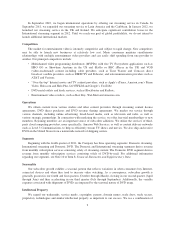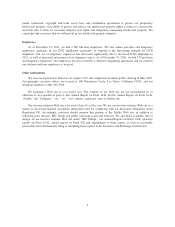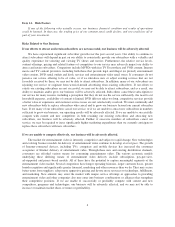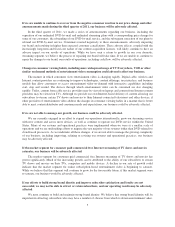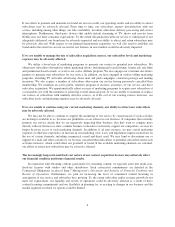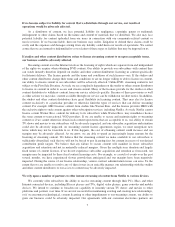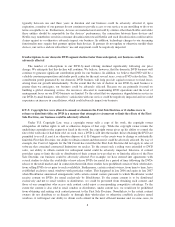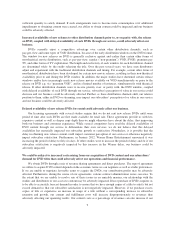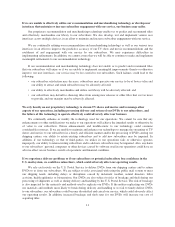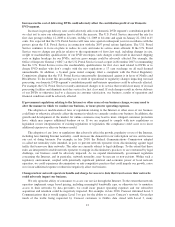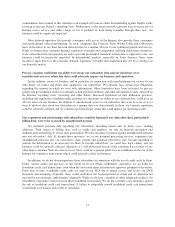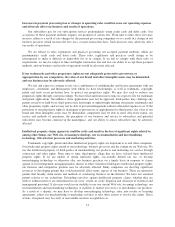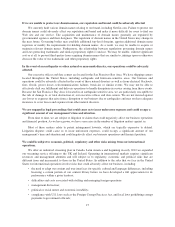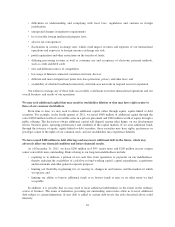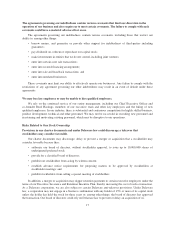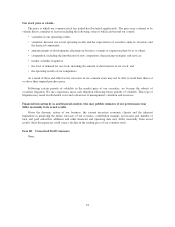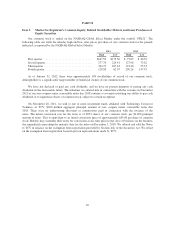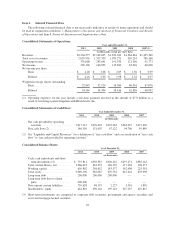NetFlix 2011 Annual Report Download - page 14
Download and view the complete annual report
Please find page 14 of the 2011 NetFlix annual report below. You can navigate through the pages in the report by either clicking on the pages listed below, or by using the keyword search tool below to find specific information within the annual report.Increases in the cost of delivering DVDs could adversely affect the contribution profit of our Domestic
DVD segment.
Increases in postage delivery rates could adversely affect our domestic DVD segment’s contribution profit if
we elect not to raise our subscription fees to offset the increase. The U.S. Postal Service increased the rate for
first class postage on May 12, 2008 to 42 cents, on May 11, 2009 to 44 cents and again on January 22, 2012 to 45
cents. It is expected that the U.S. Postal Service will raise rates again in subsequent years in accordance with the
powers given the U.S. Postal Service in connection with the 2007 postal reform legislation. The U.S. Postal
Service continues to focus on plans to reduce its costs and make its service more efficient. If the U.S. Postal
Service were to change any policies relative to the requirements of first-class mail, including changes in size,
weight or machinability qualifications of our DVD envelopes, such changes could result in increased shipping
costs or higher breakage for our DVDs, and our gross margin could be adversely affected. For example, the
Office of Inspector General (“OIG”) at the U.S. Postal Service issued a report in November 2007 recommending
that the U.S. Postal Service revise the machinability qualifications for first class mail related to DVDs or to
charge DVD mailers who don’t comply with the new regulations a 17 cent surcharge on all mail deemed
unmachinable. In addition, a by-mail game rental company filed a complaint with the Postal Regulatory
Commission alleging that the U.S. Postal Service unreasonably discriminated against it in favor of Netflix and
Blockbuster. To the extent this proceeding was to result in operational or regulatory changes impacting our mail
processing, our domestic DVD segment’s contribution profit and business operations could be adversely affected.
For example, the U.S. Postal Service recently announced changes to its service that would close many of its mail
processing facilities and eliminate next day service for first class mail. If such changes result in slower delivery
of our DVDs or otherwise lead to a decrease in customer satisfaction, our business, results of operations and
financial condition could be adversely affected.
If government regulations relating to the Internet or other areas of our business change, we may need to
alter the manner in which we conduct our business, or incur greater operating expenses.
The adoption or modification of laws or regulations relating to the Internet or other areas of our business
could limit or otherwise adversely affect the manner in which we currently conduct our business. In addition, the
growth and development of the market for online commerce may lead to more stringent consumer protection
laws, which may impose additional burdens on us. If we are required to comply with new regulations or
legislation or new interpretations of existing regulations or legislation, this compliance could cause us to incur
additional expenses or alter our business model.
The adoption of any laws or regulations that adversely affect the growth, popularity or use of the Internet,
including laws limiting Internet neutrality, could decrease the demand for our subscription service and increase
our cost of doing business. For example, in late 2010, the Federal Communications Commission adopted
so-called net neutrality rules intended, in part, to prevent network operators from discriminating against legal
traffic that transverse their networks. The rules are currently subject to legal challenge. To the extent that these
rules are interpreted to enable network operators to engage in discriminatory practices or are overturned by legal
challenge, our business could be adversely impacted. As we expand internationally, government regulation
concerning the Internet, and in particular, network neutrality, may be nascent or non-existent. Within such a
regulatory environment, coupled with potentially significant political and economic power of local network
operators, we could experience discriminatory or anti-competitive practices that could impede our growth, cause
us to incur additional expense or otherwise negatively affect our business.
Changes in how network operators handle and charge for access to data that travel across their networks
could adversely impact our business.
We rely upon the ability of consumers to access our service through the Internet. To the extent that network
operators implement usage based pricing, including meaningful bandwidth caps, or otherwise try to monetize
access to their networks by data providers, we could incur greater operating expenses and our subscriber
acquisition and retention could be negatively impacted. For example, in late 2010, Comcast informed Level 3
Communications that it would require Level 3 to pay for the ability to access Comcast’s network. Given that
much of the traffic being requested by Comcast customers is Netflix data stored with Level 3, many
12


